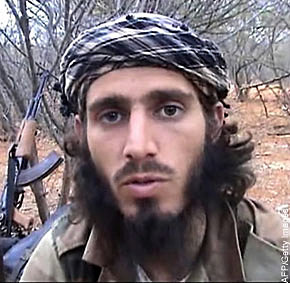|
|
|
Omar Hammami, who is also known as Abu Mansoor al Amriki. |
The US government announced yesterday that it has charged 14 people with materially supporting the terrorist group al Shabaab (along with other offenses), and that four new indictments in Minneapolis, San Diego, and Mobile, Ala., have been unsealed. [See Threat Matrix report, US indicts 14 people for supporting Shabaab.]
Not all of the names that came out yesterday are new: as Attorney General Eric Holder stated at a press conference, seven of 10 defendants charged in Minnesota “had been previously charged by either indictment or criminal complaint.” Two of the indictments are rather sparse: Omar Hammami’s indictment is quite generalized, containing no new information that cannot already be gleaned from Andrea Elliott’s superb New York Times profile of him, and the indictment of Jehad Serwan Mostafa (who, like Hammami, is believed to be in Somalia) provides only a thin sketch of his activities.
More interesting are the two indictments issued in Minnesota — one based on recruiting for al Shabaab, and the other based on fundraising for the group. The indictment for recruiting (United States v. Omar) does not go into detail about the mechanics of the Shabaab recruiting network, but makes clear that there are connections between the current indictment and previous Shabaab recruiting cases. For example, one of the individuals indicted is Cabdulaahi Ahmed Faarax, who was indicted last year. Though this has not yet been noted in public commentary, the Omar indictment links defendants associated with that recruiting network to the first American suicide bomber, Shirwa Ahmed. Paragraph 13 of the indictment states that the defendants’ actions caused (enabled?) Shirwa Ahmed to board a flight out of Minneapolis on Dec. 4, 2007, heading to Somalia as his final destination. There has thus far been no detailed analysis of the overlap and intersections between this case and the two previous major Shabaab recruiting cases (in 2008 and 2009), but some enterprising researcher could make a significant contribution by looking into this overlap.
The most interesting indictment, of Amina Farah Ali and Hawo Mohamed Hassan, provides a window into some of the terrorist financing activity undertaken for Shabaab. Ali and Hassan were working on behalf of an unnamed individual whom the indictment describes as “a member of al-Shabaab who was an al-Shabaab financial representative and then became the al-Shabaab administrative governor for the Bay and Bakool regions in Southern Somalia, after al-Shabaab seized control of those regions in February 2009.” If this identifying information is correct, this individual was Sheikh Hassan Mohamed Ali, aka Abu Ayman, former Shabaab governor for the Bay and Bakool regions.
The indictment outlines means through which fundraising took place. Today the media has been emphasizing that some of this was deceptive: that, as the indictment says, some funds were raised “under the false pretense that the funds were for the poor and needy.” But this was not the case for all the funds raised. The indictment describes teleconferences in which the two defendants, and other speakers, encouraged contributions to support jihad in Somalia. In one teleconference, on Oct. 26, 2008, Ali told the listeners that “it was not the time to help the poor and needy in Somalia; rather, the priority was to give to the mujahidin.” And in another, on Feb. 10, 2009, Ali told listeners to “forget about the other charities” and focus on “the jihad.”
After money was raised, it was sent to Shabaab through the hawala remittance system: the indictment names Dar al Tawakul General Trading, Kaah Express, Dahabshiil, Qaran Express US, Amaana Money Transfer, and Mustaqbal Express as means of transmitting funds. The money sent to Shabaab, according to the indictment, was not large: the indictment lists all such transactions in paragraph 40, and they total $8,608. The largest single transfer, occurring on March 14, 2009, was for $1,195; the smallest was $250. Of course, money will go a longer way in Somalia.
In addition to the terrorism charges, both Minnesota cases included “false statements” charges. For more on this legal mechanism, see this article.








